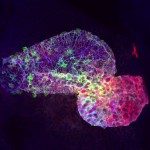Lien vers Pubmed [PMID] – 17640457
Lab. Anim. 2007 Jul;41(3):301-11
The standardized nomenclature of rodent strains, genes and mutations has long been the focus of careful attention. Its aim is to provide proper designation of laboratory animals used in research projects and to convey as much information on each strain as possible. Since the development of different techniques to mutate the genome of laboratory rodents on a large scale, the correct application of current nomenclature systems is of increased significance. It facilitates not only the accurate communication of scientific results but is indispensable in controlling the dramatically increased number of transgenic animal models in experimental units, archives and databases. It is regrettable that many publications, especially on transgenic rodents, use vague and inappropriate strain designation. This situation should definitely be improved, particularly considering the increasingly emphasized importance of genetic background on the phenotype of mutations. The aim of these guidelines is to raise awareness about specific features of production and of the current nomenclature system used for transgenic rodents.

